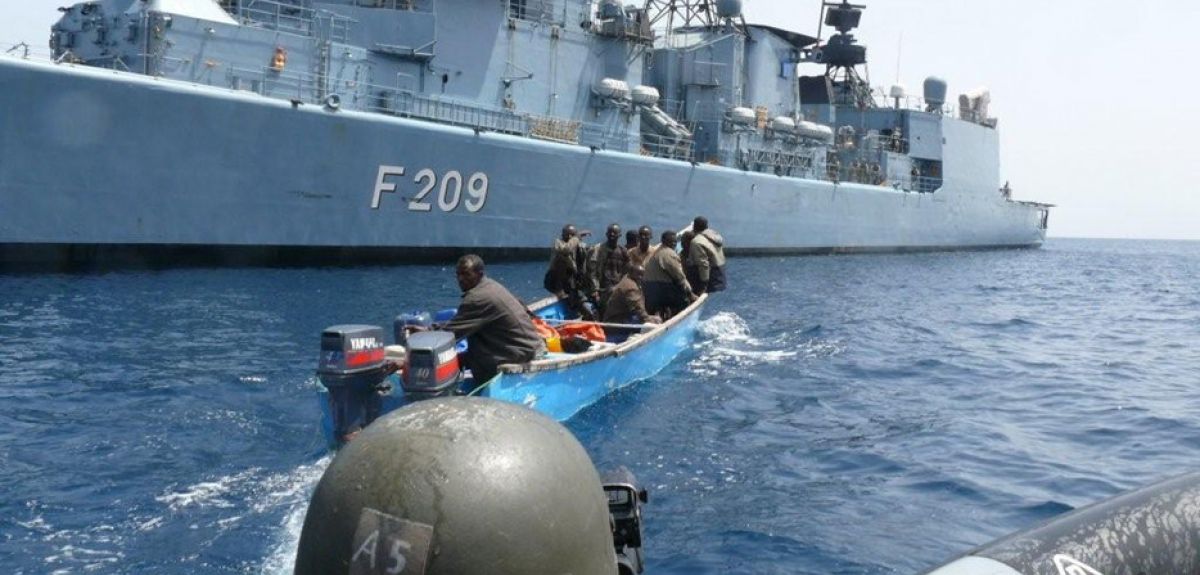
Why some Somali clans protect pirates while others don’t
Communities in Somalia protect pirates when they have no better source of income, sometimes switching back to taxing legitimate trade when economic conditions improve, argues a new report.
The international community currently relies on a costly, heavy military presence around Somalia in order to keep shipping lanes safe. However, a new academic study suggests a more sustainable way to tackle piracy would be to build new roads and harbours so clans in the remoter areas of Somalia do not miss out on legitimate trading opportunities. Put simply, a new paper, published in the British Journal of Criminology, argues that local communities are usually protecting pirates when they have no comparable alternative source of income.
The study by the University of Oxford and King’s College London argues that policy makers have focused too much on the motives of the pirates without looking at why they are receiving protection from the local elites (clan leaders). Somali clans protect legitimate interests, such as trade flows through their territory and ports, by issuing licenses to traders and charging ‘taxes’ at road-blocks and harbours. This can provide them with a steady flow of income, but the paper argues that they can switch the taxation of legitimate business to taxing the criminal activities of pirates (thus providing them with protection) if and when it provides them with a better source of revenue.
The researchers mapped the locations of pirates’ moorings of hijacked ships across the whole of Somalia, using World Bank data of moorings for hijacked ships between 2005 and 2012 based on local interviews of which coastal villages sheltered the pirates. They found that the pirate anchorages were in areas cut off from regional trading routes and harbours - chiefly in areas of disputed territory on the coast of Puntland and Central Somalia. Within these areas the researchers found that the changing face of local politics determined the intensity of piracy activity.
Clans with a steady stream of income from taxing imports and exports in their markets and ports did not offer protection to pirates. Major trading ports such as Berbera, Mogadishu or Kismayo were not found to have featured in reports of ships hijacked for ransom, says the study. In the poorer areas prone to privacy, the researchers observed surges in pirate attacks both in the run up to local elections and when territory was actively contested. The paper says this link suggests the behaviour of clan leaders in Somalia is similar to that of politicians in Italy and Taiwan, who extend protection to criminals when they need extra funds to further political ambitions.
The paper shows that local clans regarded piracy as a riskier revenue source than legitimate trade. For example, ransom negotiations could drag on for years and the distribution of spoils sometimes involved infighting between pirates. The study cites figures from the UN Monitoring Group (2011) showing that the annual income of Al Shabab in Southern Somalia was around US$70-100 million in taxation and extortion, while the World Bank (2013) calculated average total pirate ransoms of around US$50 million per year (2008-2012). About 65% of employment in Somalia is linked to the livestock sector with livestock exports making up 80% of Somalia’s export earnings. It cites the case of Bosasso within Puntland, a city commonly associated with piracy from 2005 to 2008, as an example of how boosted trade alters the local view on piracy. After the lifting of a livestock export ban in 2009, customs duties in Bosasso became a significant part of local government revenue. As the city regained its importance as a major trading port for livestock and an import centre for the wider region, pirates were no longer tolerated: pirate hostages were freed and pirates were imprisoned by the local clan leaders, remarks the paper.
Co-author Federico Varese, Professor of Criminology from the University of Oxford, said: 'A puzzle that has long been neglected in the study of the hijacking of foreign vessels off the coasts of Somalia is why only certain parts of the country’s coastline seem susceptible to harbouring pirates. The relative size of the income for protectors of trade or piracy can be likened to an on/off switch. Local communities support pirates when there isn’t a better alternative income stream. By improving the infrastructure of Somalia, building new harbours and roads to link the remote areas to trade routes, our research concludes that poorer communities would be less likely to resort to piracy.'
Co-author Dr Anja Shortland, from King's College London, said: 'Most commentators agree that a permanent solution to Somali piracy lies on land. The World Bank suggested offering a "contract out of piracy" to local communities. This requires a political settlement as a precondition for further progress. Our research indicates that given the right economic incentives, local elites spontaneously chose not to support piracy and even engaged in counter-piracy. A developmental solution to piracy could therefore be attempted even if the Somali state remains fragile.'
 Expert Comment: How can we encourage engagement with online fact-checking?
Expert Comment: How can we encourage engagement with online fact-checking?
 New analysis of archaeological data reveals how agriculture and governance have shaped wealth inequality
New analysis of archaeological data reveals how agriculture and governance have shaped wealth inequality